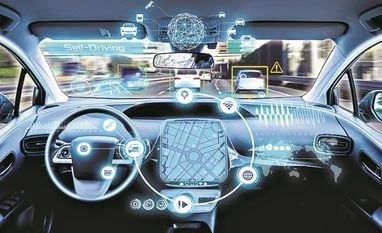Investors are throwing billions of dollars at connected cars. The technological advances that enable vehicles to be linked into wireless networks promise greater efficiency and, in theory, safety. They also open the possibility of being watched and monitored more closely — and that may be a problem for China’s self-proclaimed rival to Tesla Inc.
Nio Inc., the electric-vehicle maker that raised almost $1 billion in a New York initial public offering last month, is banking on its smart and connected car. But the plethora of cameras and sensors that dot its ES8 model has triggered concern over a potential threat to data privacy, an issue that was raised on a conference call hosted by Citigroup Inc. analysts and an auto product consultant this month.
The Shanghai-based carmaker calls itself a pioneer in automotive smart connectivity and prides itself on NOMI, an “advanced in-car AI assistant” and the NIO Pilot assisted driving system. The company doesn’t have an electric-car manufacturing license: What it does have is an autonomous vehicle testing license in California, as well as an equivalent permit in China, having been included in the first batch of companies approved for such trials this year.
NIO, already facing teething troubles and tight on cash, could do without another headwind as it tries to ramp up to meet production targets. The stock has dropped 35 percent from its September high, 1 though it remains 20 percent higher than its listing price.
Last week, the carmaker said it delivered 1,766 vehicles in September, making 3,268 for the third quarter, and is on track to reach 10,000 in the second half. That means the company has to deliver twice as many in the fourth quarter as it did in the previous three months. Those are ambitious goals.
Some have questioned whether the car is fully ready. At high speed, the braking energy recovery system “feels like there’s a deviation between the driver’s action and the car’s movement,” the consultant and analysts noted during the Citi conference call. The vehicle’s display freezes and mileage has been lower than advertised, they said.
In one case, the car ran out of battery, NIO’s anywhere-charging service ran out of electricity and the vehicle was ultimately towed away by a truck, according to a recent Southern Metropolis Daily article that detailed the experience of multiple NIO (or “Weilai” in Chinese) buyers. In response, NIO founder William Li was cited as saying that e-commerce giant Amazon.com Inc. had also had its issues and been criticized until recently.
Such difficulties may pale by comparison if security fears cause buyers to shun NIO. The ES8 has a trifocal front-facing camera, four exterior cameras and a driver monitor camera. The Chinese carmaker has a partnership with Intel Corp.’s Mobileye and is working with the advanced driver-assistance systems company to develop more such technology.
That begs the question: Where does all the data NIO collects go?
The company says it retains user information about how NIO vehicles are used to help it make better cars and “enhance the user experience.” At the same time, NIO said in its prospectus the risk of information-security failure and privacy concerns posed significant challenges.
Granted, data security will be an issue for all auto companies producing connected cars in the coming era of fifth-generation mobile networks and autonomous vehicles — and hacks and privacy breaches are far from unknown at US and European firms.
However, China’s surveillance capabilities and intentions have come into particular focus in recent months. The US has imposed sanctions on its national surveillance champions Hangzhou Hikvision Digital Technology Co. and Zhejiang Dahua Technology Co., while a Bloomberg News report this month detailed Chinese hacking of server hardware used by US companies.
Hacking so-called intelligent transport systems isn’t so difficult to do, according to a 2015 study that focused on the tracking ability of an observer without huge resources (unlike a government or big company). Another, older study that analysed data from GPS traces from vehicles driven in Detroit (by volunteers) using a home-finding algorithm, was able to pin down the locations for 85 percent of the drivers.
With increasing sophistication of NIO’s products, there’s also “an increased level of expertise of hackers,” the company noted in its IPO prospectus. Unauthorized access to and use of its systems would hurt its business, as could the costs of complying with laws and regulations on data practices, it said.
How China’s would-be Tesla responds to those threats may determine its prospects.
Unlock 30+ premium stories daily hand-picked by our editors, across devices on browser and app.
Pick your 5 favourite companies, get a daily email with all news updates on them.
Full access to our intuitive epaper - clip, save, share articles from any device; newspaper archives from 2006.
Preferential invites to Business Standard events.
Curated newsletters on markets, personal finance, policy & politics, start-ups, technology, and more.
)